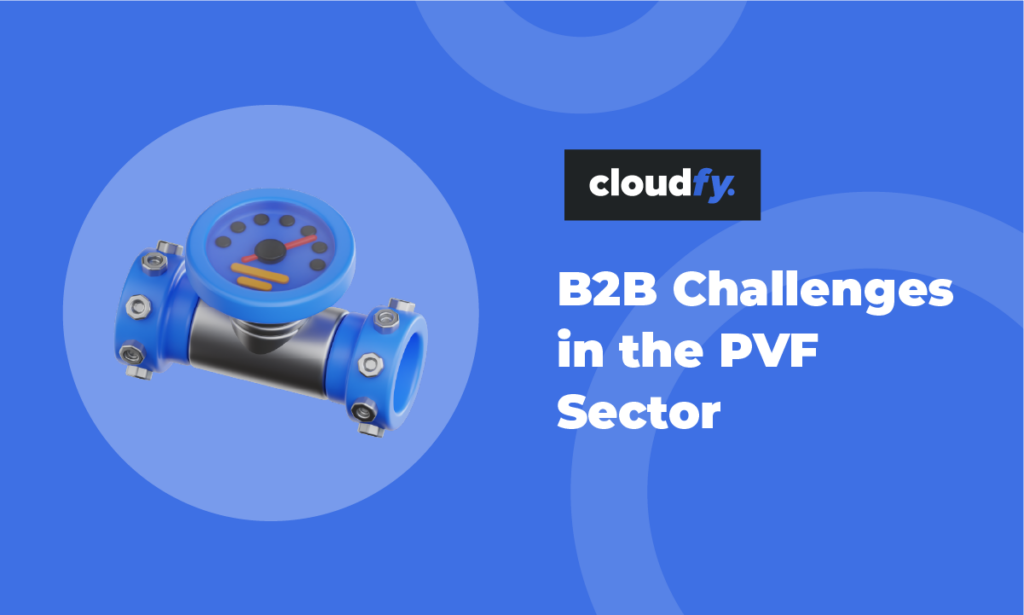Cloudfy has established itself as a leading business to business (B2B) ecommerce platform. It’s recognized for delivering fast deployment, easy configuration and rich functionality.
However, when you’re looking for a B2B ecommerce solution there are a lot of options to consider. One of the most widely used alternative ecommerce platforms is Magento. In 2018 Adobe acquired the company. You can still use Magento as a self-hosted open source platform supported by the Magento community. There’s also Adobe Commerce which is now part of the Adobe Experience Cloud.
Table of Contents
How does Cloudfy stack up against Magento and why would you choose one platform over the other?
Cloudfy is designed to help your growing manufacturing or distribution business simplify processes, save money and scale operations.
Many ecommerce platforms that were originally build for consumer sales have added some B2B functionality. However, they don’t provide the depth and breadth of B2B features you need.
Cloudfy is a software as a service (SaaS) solution so your online sales take place securely in the cloud. You don’t have to worry about the IT infrastructure, maintenance or upgrades. It’s all done for you.
It also comes with pre-built integrations for:

The benefits of Cloudfy
B2B sales take longer and are much more complex than consumer sales. B2B ecommerce platforms serve a different customer and purchasing profile.
Cloudfy has been designed from the ground up to meet the needs of complex B2B sales. It’s optimized for design, user experience and back office management.
Cloudfy comes with key B2B ecommerce features such as:
- quick ordering
- category page ordering
- customer specific pricing
- business systems integration.
Latest technology
Cloudfy’s continuous development and new feature releases mean you’re always a step ahead of your competitors. As a cloud based ecommerce platform you don’t need to work with a web agency to set up your servers. It’s completely self-contained and can scale up and down depending on demand. Changes, fixes and new functionality are deployed in the cloud at the same time. All Cloudfy’s customers stay up to date with the latest features. It’s a solution that can grow with your business, providing all the B2B functionality you need.
Total cost of ownership
Most importantly, you don’t need to make a large capital outlay to launch your Cloudfy site. It’s simply based on a pay-monthly service that includes the platform, support, hosting, upgrades and new functionality.
Configuration vs customization
You can easily configure Cloudfy using its changeable home page designs, layouts, product data, tax configuration, and systems integration. You don’t need customization and expensive, time consuming development.
Continuous improvement
Cloudfy’s team of specialists constantly adds new features and, as soon as they’re deployed, they are available to all customers. Customers can request new functionality and where it’s seen as widely beneficial the team will aim to provide it. This collaborative approach leads to a strong and vibrant community alongside a great cloud based B2B ecommerce platform.

The benefits of Magento
Magento Open Source is widely used because anyone can download it, modify and use it. However, while it’s free, it takes knowledge and skill to set up, configure and maintain a Magento ecommerce site.
Developer community
That needn’t be a problem because there’s a large developer community. Thanks to its highly customizable design businesses around the world use it in many different ways. However, this can mean relying on expert developers which could cost a lot and represent a risk to your business. In addition, you will also need to consider the costs of hosting, maintenance and ongoing security.
Futureproofing
It’s also worth considering your roadmap for the future. Your growing business might want to target multiple customer groups, add advanced personalization, improve business insights and strengthen security. Adobe Commerce might seem the obvious migration route when you reach this point. However, this will effectively be a replatforming project. Although migration tools are available it will be a major step when the time comes. Your customizations and carefully curated plug-ins and extensions might not work in the same way.
Extension marketplace
The Adobe Commerce Marketplace has an App Assurance Program and a network of consulting companies. There are training courses and a certification program to give reassurance. It provides a select collection of thousands of high-quality apps and extensions. However, the challenge is maintaining security and quality across all the plugins and extensions you choose.
Continuous improvement
The Magento Community actively works on improvements for Magento. It provides new features, better security, and improved performance. However, you’ll be responsible for keeping your Magento site up to date and secure. This is critical to make sure it remains stable and performs well so you can take advantage of new features.

Magento vs Cloudfy: Your choice
Of course, the choice you make depends on your business needs. We’re proud of the powerful, purpose designed Cloudfy B2B ecommerce solution we’ve created to scale and grow with your business. You have the support of B2B ecommerce experts and a clear route to expand online as your sales increase.
Magento Open Source offers you almost limitless possibilities but with this comes complexity. You must be much more involved in developing and maintaining your B2B ecommerce solution. As your business needs change you will need to make sure your site remains fit for purpose.
Before you make your decision we recommend you find out more about Cloudfy’s outstanding scalability and B2B ecommerce functionality. Book a free demonstration today.
Frequently Asked Questions
Both platforms offer key B2B functionality such as order processing, customer logins, inventory visibility, online payment management, order histories, promotions and marketing. However, when it comes to advanced B2B features and business systems integration for seamless operations Cloudfy has the edge.
The flexibility of Magento means you must manage extra complexity. Your in-house teams are likely to need the support of expert developers to enhance, use and maintain your site. In contrast, Cloudfy’s easy to use dashboard means multiple teams can manage and update your site without expert help. If you have any questions the Cloudfy team is always on-hand.
Both platforms allow you to customize your ecommerce site to meet your business needs. You can create a fully branded site, manage product information and streamline purchasing. However, Magento customizations require additional plugins, extensions and, in many cases, support from expert developers. In contrast, with Cloudfy’s pre-built extensions and integrations, many customizations are easy to implement. You can ask for the help of the support team if you need it.
Magento allows you to integrate third-party applications and business systems, including payment gateways, ERP systems and CRM solutions. However, these are each implemented on a modular basis so you’ll need to maintain an overview of how everything works together. Cloudfy includes integrations with leading business systems and third-party applications straight out of the box. This makes integration fast and easy to maintain.






